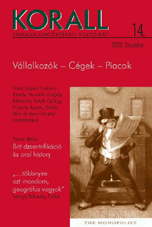„Béts tárháza”. Moson vármegye paraszti gazdasága az alsó-ausztriai piacon a rendi korszak végén
“Repository of Vienna.” The Peasant Economy of Moson County on the Market in Lower-Austria towards the End of the Feudal Era
Author(s): Gergely Krisztián HorváthSubject(s): History
Published by: KORALL Társadalomtörténeti Egyesület
Keywords: Hungary; social history; economic history; 19th century; Moson County; Wien; Lower-Austria; peasantry; commerce; transportation; market; agriculture; statistics; export
Summary/Abstract: This study investigates the role of the former Moson County (Wieselburger Komitat) in the provision of the market in Vienna. Contemporary works agree that Moson County performed a significant role in supplying Vienna with food products. In the first part of this study the author states that due to economic reforms, by the 1840’s the discrimination against Hungarian products at the customs had almost entirely vanished. Taking the 1842 value as measure, in the commerce between the two countries, Hungarian export goods carried only 1.36% higher duty than Austrian ones. The second part of the study deals with 76 out of 333 items registered in the trade statistics of the goods that constituted a significant part of the trade to Lower Austria. By ranking these goods according to their price, quantity and share of export, the study concludes that goods originating in Moson County, more closely, in the peasant economy, had a large share in the export to Lower Austria. Thus, facts drawn from narrative sources seem to be justified: Moson County, more closely, its peasantry (unlike big estates) was in reality the most important provider of food products for the market in Vienna.
Journal: Korall - Társadalomtörténeti folyóirat
- Issue Year: 2003
- Issue No: 14
- Page Range: 29-53
- Page Count: 25
- Language: Hungarian

